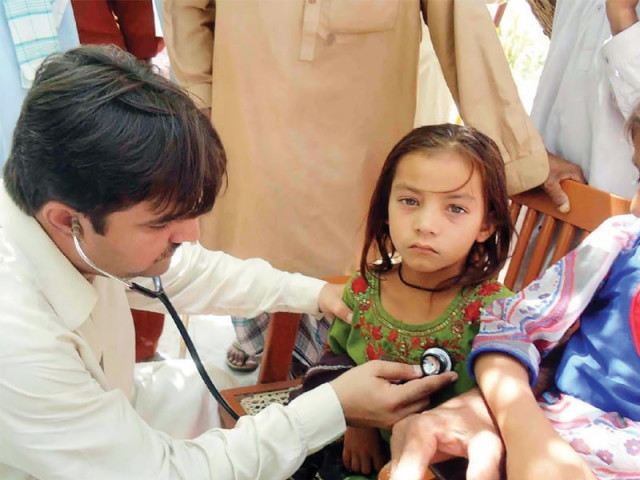Rise in diseases: As the temperature soars, waterborne diseases also rise
Over 3,000 cases of diarrhoea reported on Wednesday and 41 on Friday.

A doctor examines a girl who fell sick after drinking water from a hand pump installed at Khabri Bhit Primary School near Salehpat, Sukkur. Over 30 other students and a teacher also fell ill after drinking water. PHOTO: PPI
As the mercury shoots upwards, the scorching heat is not the only difficulty Sindh’s residents have to face. The heat wave which is sweeping the province has brought with it a number of waterborne diseases.
A staggering 3,364 cases of diarrhoea were reported on Wednesday. Then on Friday - just two days later - 41 people got sick after drinking water from a hand pump set up in Khabri Bhit Primary School near Salehpat, Sukkur. After spending hours in hot classrooms, the students rushed to the pump during recess. Soon after gulping down the water, they started complaining of aching stomachs and fell sick.
The school’s headmaster Allah Dad Shambhani, rang up their parents and told the high-ups about the incident. Sukkur’s commissioner, Dr Niaz Ali Abbasi, rushed to the spot and called for doctors, who examined and treated the students. Some students, including Zahid Hussain, Ghulam Mustafa, Abdul Majeed, Mithal Bhatti, Suhrab Bhatti, were referred to the Civil hospital while the remaining were taken to the rural health centre in Salehpat. Even a schoolteacher, Niaz Ali Bhatti, fell sick after drinking the contaminated water.

Despite several attempts to contact him, the school’s headmaster was not available for comments. While talking to The Express Tribune, Sukkur’s commissioner said an empty bottle of pesticide was lying in a pool of water near the hand pump. He speculated that the pesticide might have had something to do with the incident. “Some of it might have trickled down in the soil and have contaminated the water.” He added that the situation was under control, the children were out of danger and that an inquiry is being launched into the incident.
Pathogens on the rise?
Though it has yet to be determined whether the pesticide played a role, the health department’s statistics seem to indicate a rise in the number of pathogens in the water in the summer season.
This, combined with the lack of chlorinated water, has resulted in over 31,000 cases of diarrhoea reported in just the current month, according to an official health department report. This has also resulted in the deaths of almost six people, most of whom were children. Apart from diarrhoea, there has also been an alarming rise in the cases of hepatitis A, B and C.

The caretaker health minister, Dr Junaid Ali Shah, told The Express Tribune that the government has already established a cell in Hyderabad, under the supervision of DG Health Dr Ashfaq Memon, to provide emergency relief across the province. These diseases are caused by the intense heat waves and contaminated water, he said, adding that the department has also established a six-member focal group to provide chlorine tablets across the province.
“We have collected samples from different areas of Karachi,” he said. “We are also using tablets of chlorine to prevent people from being infected by Naegleria Fowleri and other germs.”
According to Dr Shah, the World Health Organisation (WHO) provided 100,000 chlorine tablets. “Due to a lack of infrastructure, we were unable to provide chlorinated water to the tail end of Karachi,” he explained. “We have already requested WHO to provide more tablets.”
What will the future of hepatitis control look like? Dr Shah said the problem lies with finance. “If the finance department releases the funds, we can buy the medicines needed to prevent the lethal disease [hepatitis],” he said.
KWSB satisfied
The managing director of the Karachi Water and Sewerage Board, Misbahuddin Farid, was nevertheless satisfied with the provision chlorinated water across the city. The government’s focal group collected 41 samples across the city and of these 39 samples had standard chlorine levels, he said.
Published in The Express Tribune, June 1st, 2013.



















COMMENTS
Comments are moderated and generally will be posted if they are on-topic and not abusive.
For more information, please see our Comments FAQ